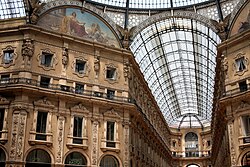Galleria Vittorio Emanuele II
 |
|
| Location | Milan, Italy |
|---|---|
| Coordinates | 45°27′56″N 9°11′24″E / 45.46556°N 9.19000°ECoordinates: 45°27′56″N 9°11′24″E / 45.46556°N 9.19000°E |
| Opening date | 1877 |
| Owner | Comune of Milan |
| Architect | Giuseppe Mengoni |
| Public transit access |
|
The Galleria Vittorio Emanuele II (Italian: [ɡalleˈriːa vitˈtɔːrjo emanuˈɛːle seˈkondo]) is one of the world's oldest shopping malls. Housed within a four-story double arcade in central Milan, the Galleria is named after Victor Emmanuel II, the first king of the Kingdom of Italy. It was designed in 1861 and built by Giuseppe Mengoni between 1865 and 1877.
The structure consists of two glass-vaulted arcades intersecting in an octagon covering the street connecting Piazza del Duomo to Piazza della Scala. The street is covered by an arching glass and cast iron roof, a popular design for 19th-century arcades, such as the Burlington Arcade in London, which was the prototype for larger glazed shopping arcades, beginning with the Saint-Hubert Gallery in Brussels (opened in 1847), the Passazh in St Petersburg (opened in 1848), the Galleria Umberto I in Naples (opened in 1890) and the Budapest Galleria.
The central octagonal space is topped with a glass dome. The Milanese Galleria was larger in scale than its predecessors and was an important step in the evolution of the modern glazed and enclosed shopping mall, of which it was the direct progenitor. It has inspired the use of the term galleria for many other shopping arcades and malls.
...
Wikipedia
